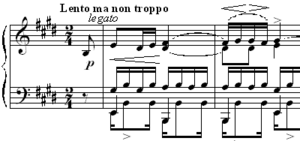The Études by Frédéric Chopin are a group of very famous and challenging piano pieces. Chopin was a brilliant Polish composer. An étude (pronounced "eh-tood") is a musical piece designed to help musicians practice and improve a specific skill. Chopin's Études are not just exercises; they are also beautiful works of art often played in concerts.
About These Pieces

"In all my life I have never again been able to find such a beautiful melody." -Chopin, on Op. 10, No. 3
Chopin's Études are known as some of the most difficult pieces ever written for the piano. Because they are so challenging and beautiful, they are still very popular today and are often performed by pianists in concerts. Some of these pieces have special nicknames, but Chopin himself did not give them these names. For example, the last Étude from his first set (Opus 10) is called the Revolutionary. This name came about because the piece was inspired by the November 1830 Uprising, when Polish people fought against the Russian Empire but were defeated.
All twenty-seven of Chopin's Études were published while he was still alive. The first group of twelve, called Opus 10, was written between 1829 and 1832. They were published in 1833 in France, Germany, and England. The next twelve Études, known as Opus 25, were composed at different times from 1832 to 1836. They were published in the same countries in 1837. The last three Études were composed in 1839. They were part of a larger music collection put together by other musicians, so they don't have an "Opus" number.
Chopin wrote the first Études of the Opus 10 set when he was still a teenager. Before Chopin, études were mostly seen as simple practice exercises. But Chopin changed this! He made them into amazing artistic masterpieces that were both challenging to play and wonderful to listen to. A famous composer named Robert Schumann once said "À la Chopin" (meaning "in Chopin's style") after hearing him perform his Opus 25 pieces.
List of Études
Opus 10 Études
| Name |
Key |
Name |
Key |
| Étude Op. 10, No. 1 |
C major |
Étude Op. 10, No. 7 |
C major |
| Étude Op. 10, No. 2 |
A minor |
Étude Op. 10, No. 8 |
F major |
| Étude Op. 10, No. 3 |
E major |
Étude Op. 10, No. 9 |
F minor |
| Étude Op. 10, No. 4 |
C-sharp minor |
Étude Op. 10, No. 10 |
A-flat major |
| Étude Op. 10, No. 5 |
G-flat major |
Étude Op. 10, No. 11 |
E-flat major |
| Étude Op. 10, No. 6 |
E-flat minor |
Étude Op. 10, No. 12 |
C minor |
Opus 25 Études
| Name |
Key |
Name |
Key |
| Étude Op. 25, No. 1 |
A-flat major |
Étude Op. 25, No. 7 |
C-sharp minor |
| Étude Op. 25, No. 2 |
F minor |
Étude Op. 25, No. 8 |
D-flat major |
| Étude Op. 25, No. 3 |
F major |
Étude Op. 25, No. 9 |
G-flat major |
| Étude Op. 25, No. 4 |
A minor |
Étude Op. 25, No. 10 |
B minor |
| Étude Op. 25, No. 5 |
E minor |
Étude Op. 25, No. 11 |
A minor |
| Étude Op. 25, No. 6 |
G-sharp minor |
Étude Op. 25, No. 12 |
C minor |
Three New Études
Images for kids
-
Two bars of Étude Op. 25, No. 11
See also
 In Spanish: Estudios (Chopin) para niños
In Spanish: Estudios (Chopin) para niños
 In Spanish: Estudios (Chopin) para niños
In Spanish: Estudios (Chopin) para niños





